Related Research Articles

The Nabis were a group of young French artists active in Paris from 1888 until 1900, who played a large part in the transition from Impressionism and academic art to abstract art, symbolism and the other early movements of modernism. The members included Pierre Bonnard, Maurice Denis, Paul Ranson, Édouard Vuillard, Ker-Xavier Roussel, Félix Vallotton, Paul Sérusier and Auguste Cazalis. Most were students at the Académie Julian in Paris in the late 1880s. The artists shared a common admiration for Paul Gauguin and Paul Cézanne and a determination to renew the art of painting, but varied greatly in their individual styles. They believed that a work of art was not a depiction of nature, but a synthesis of metaphors and symbols created by the artist. In 1900, the artists held their final exhibition and went their separate ways.
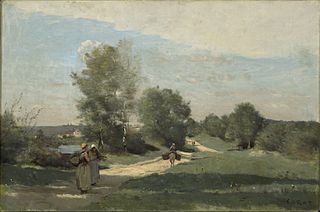
The Barbizon school of painters were part of an art movement toward Realism in art, which arose in the context of the dominant Romantic Movement of the time. The Barbizon school was active roughly from 1830 through 1870. It takes its name from the village of Barbizon, France, on the edge of the Forest of Fontainebleau, where many of the artists gathered. Most of their works were landscape painting, but several of them also painted landscapes with farmworkers, and genre scenes of village life. Some of the most prominent features of this school are its tonal qualities, color, loose brushwork, and softness of form.
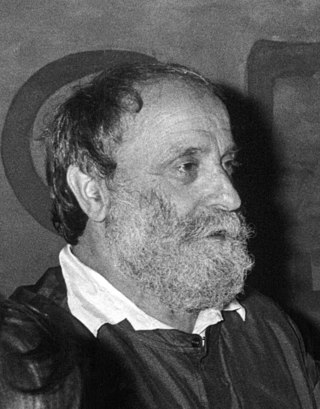
César, also occasionally referred to as César Baldaccini, was a noted French sculptor.

Jean-Honoré Fragonard was a French painter and printmaker whose late Rococo manner was distinguished by remarkable facility, exuberance, and hedonism. One of the most prolific artists active in the last decades of the Ancien Régime, Fragonard produced more than 550 paintings, of which only five are dated. Among his most popular works are genre paintings conveying an atmosphere of intimacy and veiled eroticism.

Nouveau réalisme is an artistic movement founded in 1960 by the art critic Pierre Restany and the painter Yves Klein during the first collective exposition in the Apollinaire gallery in Milan. Pierre Restany wrote the original manifesto for the group, titled the "Constitutive Declaration of New Realism," in April 1960, proclaiming, "Nouveau Réalisme—new ways of perceiving the real." This joint declaration was signed on 27 October 1960, in Yves Klein's workshop, by nine people: Yves Klein, Arman, Martial Raysse, Pierre Restany, Daniel Spoerri, Jean Tinguely and the Ultra-Lettrists, Francois Dufrêne, Raymond Hains, Jacques de la Villeglé; in 1961 these were joined by César, Mimmo Rotella, then Niki de Saint Phalle and Gérard Deschamps. The artist Christo showed with the group. It was dissolved in 1970.

20th-century French art developed out of the Impressionism and Post-Impressionism that dominated French art at the end of the 19th century. The first half of the 20th century in France saw the even more revolutionary experiments of Cubism, Dada and Surrealism, artistic movements that would have a major impact on western, and eventually world, art. After World War II, while French artists explored such tendencies as Tachism, Fluxus and New realism, France's preeminence in the visual arts progressively became eclipsed by developments elsewhere.

Ambroise Vollard was a French art dealer who is regarded as one of the most important dealers in French contemporary art at the beginning of the twentieth century. He is credited with being a major supporter and champion of the contemporary artists of his period, providing exposure and emotional support to numerous then-unknown artists, including Paul Cézanne, Aristide Maillol, Pierre-Auguste Renoir, Louis Valtat, Pablo Picasso, André Derain, Georges Rouault, Paul Gauguin, and Vincent van Gogh.
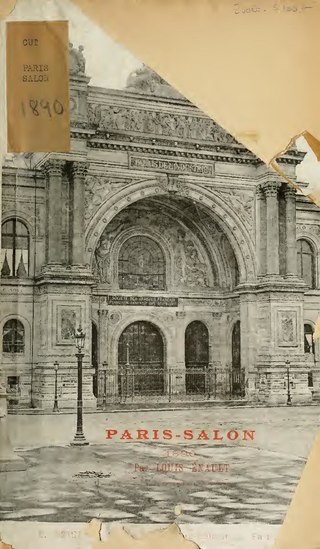
Société Nationale des Beaux-Arts was the term under which two groups of French artists united, the first for some exhibitions in the early 1860s, the second since 1890 for annual exhibitions.
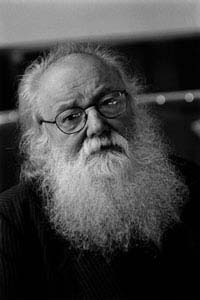
Pierre Restany, was an internationally known French art critic and cultural philosopher.

Miquette Giraudy is a French keyboard player and vocalist, best known for her work in Gong, and with her partner Steve Hillage. She and Hillage form the core of the ambient band System 7. She has also worked as an actress, film editor and writer, in each role using different stage names.
Jean-Claude Vannier is a French musician, composer and arranger. Vannier has composed music, written lyrics, and produced albums for many singers.

Maurice Benayoun is a French new-media artist, curator, and theorist based in Paris and Hong Kong.
The Biennale de Paris is a noted French art festival, established in 1959. In 1983, the organization ceased functions, until its reestablishment in 2000 with the first exhibition of the new era occurring in 2004.
Sociological Art is an artistic movement and approach to aesthetics that emerged in France in the early 1970s and became the basis for the Sociological Art Collective formed by Hervé Fischer, Fred Forest, and Jean-Paul Thenot in 1974.
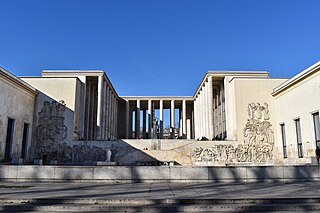
Musée d'Art Moderne de Paris or MAM Paris, is a major municipal museum dedicated to modern and contemporary art of the 20th and 21st centuries, including monumental murals by Raoul Dufy, Gaston Suisse, and Henri Matisse. It is located at 11, Avenue du Président Wilson in the 16th arrondissement of Paris.

Jean Hugo was a painter, illustrator, theatre designer and author. He was born in Paris and died in his home at the Mas de Fourques, near Lunel, France. Brought up in a lively artistic environment, he began teaching himself drawing and painting and wrote essays and poetry from a very early age. His artistic career spans the 20th century, from his early sketches of the First World War, through the creative ferment of the Parisian interwar years, and up to his death in 1984. He was part of a number of artistic circles that included Jean Cocteau, Raymond Radiguet, Pablo Picasso, Georges Auric, Erik Satie, Blaise Cendrars, Marie-Laure de Noailles, Paul Eluard, Francis Poulenc, Charles Dullin, Louis Jouvet, Colette, Marcel Proust, Jacques Maritain, Max Jacob, Carl Theodor Dreyer, Marie Bell, Louise de Vilmorin, Cecil Beaton and many others.

Galerie Kamel Mennour is a contemporary art gallery in Paris, France, owned and directed by Kamel Mennour.

Jean Pierre François Lamorinière, Jan Pieter Frans Lamorinière or François Lamorinière was a Belgian landscape painter best known for his realistic depictions of landscapes in his home country. His work is situated between the previous generation of the Romantic landscape painters and the Realist landscape.
References
- 1 2 3 4 CIGAINERO, Jake (17 June 2015). "Martial Raysse Takes Center Stage at Last". New York Times. Retrieved 17 June 2015.
- ↑ "Jupiter (1971) - IMDb". IMDb .
- ↑ "Le grand départ (1972) - IMDb". IMDb .